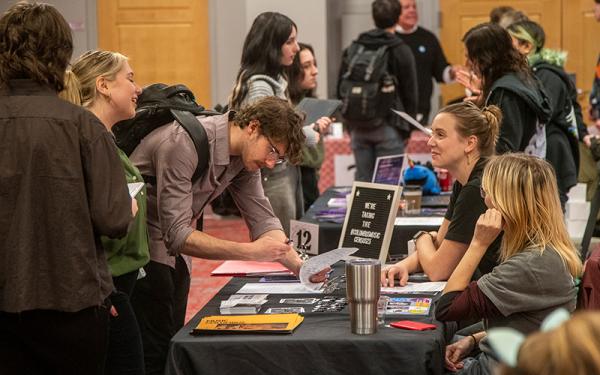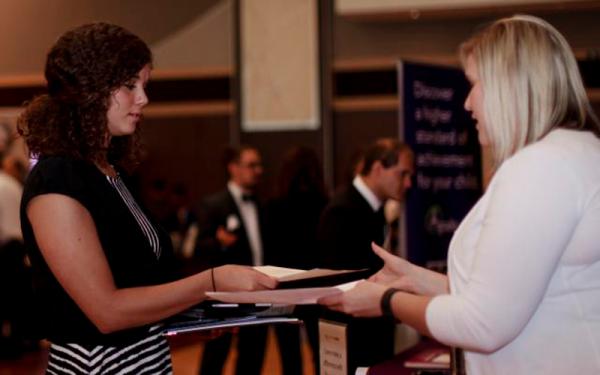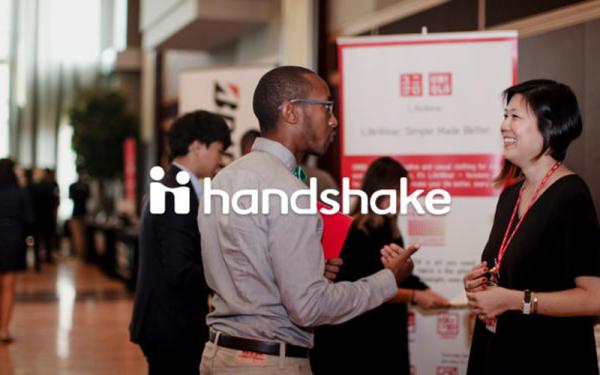Careers & Internships
WGSS students develop critical thinking, communication, collaboration, research, and leadership skills that are highly valued by employers. These skills can be applied to a wide range of industries, providing students flexibility to adapt to a rapidly changing job market.
Additionally, as an interdisciplinary field, WGSS prepares students to pursue graduate school in the humanities and social sciences as well as professional school in law and the health sciences (when WGSS is paired with a major in the sciences).
WGSS offers internship and service-learning courses so that students can further explore the fields they wish to pursue. Additionally, the university and the College of Arts and Sciences offer a wide range of professional development resources for students.
WGSST 3191: Internship in Women's, Gender and Sexuality Studies
WGSST 3191: Internship in Women's, Gender and Sexuality Studies will be offered every autumn, spring, and summer semester! It is a variable-credit-hour internship (1-3 credit hours per term) that can be used to fulfill certain course requirements in eligible programs.
Students are responsible for seeking-out and securing all internships. However, the department has put together a directory of organizations and businesses with potential internship opportunities (see drop-down below). We encourage students to look at the list and reach out to organizations and businesses directly to inquire about current openings.
For more information, please contact the WGSS Education Program Specialist.
Students seeking to enroll in WGSST 3191 must submit an internship application to the WGSS Education Program Specialist by no later than the Friday BEFORE the first week of the semester in which their internship will take place (retroactive credit cannot be granted). Students are required to obtain input from their internship site for sections 3 and 6; therefore, they should allot sufficient time to complete the form. Students will be enrolled in WGSST 3191 as soon as their internship applications have been approved. Upon completion of the internship, students must submit an exit survey and supervisor assessment to receive their grades.
Current Internship Calls:
Position: TransOhio Student Intern
Social Media Intern: (10 hours/week)
WGSS students are encouraged to explore internship and volunteer opportunities at the following organizations. This list is not exhaustive; rather, it serves as a starting point for students.
- Community Refugee and Immigration Services (CRIS)
- Equality Ohio
- Freedom a la Cart
- Innovation Ohio
- Kaleidoscope Youth Center
- Ohio Juvenile Justice Coalition
- Ohio State Wexner Medical Center
- Planned Parenthood of Greater Ohio
- Sexual Assault Network of Central Ohio (SARNCO)
- Stonewall Columbus
- TransOhio
- Women's Fund of Central Ohio
- Young Survival Coalition
- YWCA
Service-Learning
Service-learning is an approach to community-engaged teaching “…that integrates meaningful community service with instruction and reflection to enrich the learning experience, teach civic responsibility, and strengthen communities” (Seifer and Connors, National Service-Learning Clearinghouse, 2007).
With support from the Ohio State Office of Service-Learning and Community-Engaged Teaching, WGSS offers three service-learning courses:
WGSST 2326S: Feminist Perspectives on Addiction (3 credit hours)
WGSST 3300.01S: Feminist Perspectives of Incarceration in the U.S. (3 credit hours)
WGSST 4189.01S: Reproductive Rights and Justice (3 credit hours)
In each of these courses, theory meets practice, giving students hands-on, real-world experience. Read more about the courses in the drop-downs below.
This course offers a multicultural feminist perspective on women and addiction. Using an interdisciplinary approach, students will explore addiction within the contexts of social construction, popular culture, mental health, and public policy. Discussion topics explore the socially constructed meanings of addiction, gender, power, and privilege. This service-learning offering combines the study of feminist scholarship on addiction with volunteer work at a local organization that provides services to persons with substance-abuse issues. Students will use the course materials and tools of analysis to think and write critically about their volunteer experiences. Not open to students with credit for 2326.
This course explains the growth in the U.S. prison system and its punitive shift from feminist, anti-racist, and queer perspectives. Students will learn about the historical and ongoing disproportionate incarceration of the poor, people of color, and gender non-conforming people. This service-learning course is an Inside-Out Prison Exchange Program class, part of the Ohio Prison Education Exchange Project (OPEEP). Enrollment requires permission of the instructor.
Why is reproduction such a controversial issue, both in the U.S. and in many parts of the world? What do we mean by reproductive rights, and what is the relationship between rights and reproductive justice? How do reproductive technologies—such as surrogacy, IVF, new contraceptives—shape reproductive politics? What is the relationship between reproductive rights, justice, and feminism? This course takes an interdisciplinary feminist approach to investigating the history and contemporary politics of reproduction beyond a “pro-life” vs. “pro-choice” dichotomy. It focuses on both U.S. and global contexts and links the academic investigation to service-learning in the Columbus community. Students will work with organizations that seek to further the goals of reproductive justice in policy, activist, legal, and health care contexts. Throughout the course, students will probe the connections between academic coursework and feminist practice, and link theoretical study to their work in local communities. Prerequisite: WGSST 1110. Due to limited space, enrollment requires instructor permission.
What can I do with a WGSS degree?
Digital strategist. Fundraiser. Lawyer. Researcher. Educator. These are just a few of the professions of WGSS alumni.
Let's take a closer look at some of the job titles of WGSS graduates:
- Digital state campaigns manager
- Digital communications and strategy manager
- Development and marketing manager
- Communications and research associate
- Technical writer
- Academic advisor
- Attorney
- Professor
- Real estate broker
- Grants manager
Our graduates have built careers at a variety of organizations, from advocacy organizations to health care systems.
Here are some of the organizations where our alumni have worked:
- Planned Parenthood Federation of America
- Amnesty International
- Smithsonian Institution
- The Women’s Fund of Central Ohio
- Innovation Ohio
- League of Women Voters
- The Ohio State University
- Mount Carmel Health System
- United Healthcare
- OhioHealth Sexual Assault Response Network (SARNCO)



